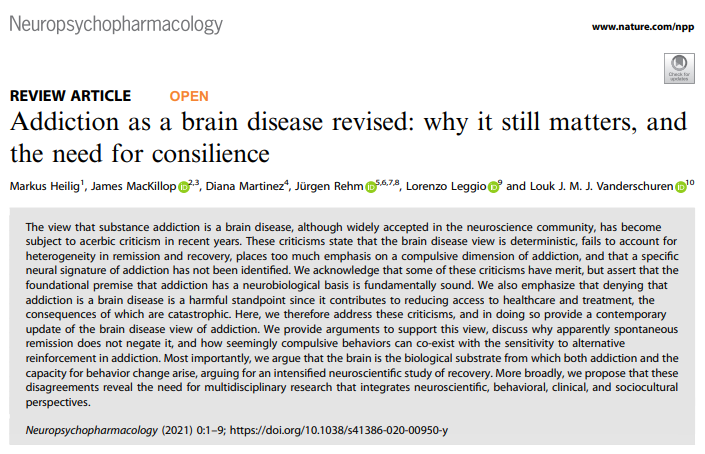
THREAD 1/
Harrow et al. have published another study demonstrating an association between antipsychotic treatment and poorer outcomes compared to non-antipsychotic treatment, this time for both schizophrenia and affective psychosis.
Harrow et al. have published another study demonstrating an association between antipsychotic treatment and poorer outcomes compared to non-antipsychotic treatment, this time for both schizophrenia and affective psychosis.

2/
To date, no RCT (no, not even Wunderink) exists to address potential causality or more precisely *direction* of causality. The million $$ question is whether antipsychotic discontinuation leads to recovery or whether recovery leads to discontinuation.
psychologytoday.com/us/blog/psych-…
To date, no RCT (no, not even Wunderink) exists to address potential causality or more precisely *direction* of causality. The million $$ question is whether antipsychotic discontinuation leads to recovery or whether recovery leads to discontinuation.
psychologytoday.com/us/blog/psych-…
3/
Harrow often uses baseline prognosis as a proxy of severity to address this question, but the only thing that really matters is *actual* disease severity. Why were meds stopped?
This is a chicken-egg issue as I discuss w/@awaisaftab here:
psychiatrictimes.com/view/there-bac…
Harrow often uses baseline prognosis as a proxy of severity to address this question, but the only thing that really matters is *actual* disease severity. Why were meds stopped?
This is a chicken-egg issue as I discuss w/@awaisaftab here:
psychiatrictimes.com/view/there-bac…
4/
In his latest paper, Harrow writes "participants not prescribed antipsychotic medication are more likely to experience more episodes of recovery."
But without temporal knowledge of which came first, that's an unjustified and misleading leap.
In his latest paper, Harrow writes "participants not prescribed antipsychotic medication are more likely to experience more episodes of recovery."
But without temporal knowledge of which came first, that's an unjustified and misleading leap.
5/
Isn't it just as likely, if not moreso based on shorter-term data, that "participants with more episodes of recovery are more likely to have antipsychotics deprescribed or discontinued?"
That's consistent with my clinical experience and practice.
Isn't it just as likely, if not moreso based on shorter-term data, that "participants with more episodes of recovery are more likely to have antipsychotics deprescribed or discontinued?"
That's consistent with my clinical experience and practice.
6/
The "supersensitivity psychosis" (SSP) hypothesis is often invoked when psychiatrists note that our patients worsen off meds, to counter claims of simple symptomatic recurrence/relapse.
But it's unclear why Harrow invokes it by way of explanation here...
The "supersensitivity psychosis" (SSP) hypothesis is often invoked when psychiatrists note that our patients worsen off meds, to counter claims of simple symptomatic recurrence/relapse.
But it's unclear why Harrow invokes it by way of explanation here...
7/
Based on the outcomes in his study, there's no mention of those who discontinued medications having symptomatic worsening. On the contrary, the patients did fine off meds which supports that the good/bad outcomes are due to underlying disease state/course, not the meds.
Based on the outcomes in his study, there's no mention of those who discontinued medications having symptomatic worsening. On the contrary, the patients did fine off meds which supports that the good/bad outcomes are due to underlying disease state/course, not the meds.
8/
"If we imagined similar long-term studies of meds like anti-hypertensives or sulfonylureas, I don't think we'd be surprised if illness morbidity was greater among those who had to remain on medication due to illness severity, without invoking a medication toxicity effect."
"If we imagined similar long-term studies of meds like anti-hypertensives or sulfonylureas, I don't think we'd be surprised if illness morbidity was greater among those who had to remain on medication due to illness severity, without invoking a medication toxicity effect."
9/
Now to be clear, Harrow's data clearly show that SOME patients diagnosed w/ schizophrenia can come off antipsychotic meds.
Less is often more.
The key question remaining is WHO can do so safely, an issue I address here for 1st-episode psychosis:
pubmed.ncbi.nlm.nih.gov/33257137/
Now to be clear, Harrow's data clearly show that SOME patients diagnosed w/ schizophrenia can come off antipsychotic meds.
Less is often more.
The key question remaining is WHO can do so safely, an issue I address here for 1st-episode psychosis:
pubmed.ncbi.nlm.nih.gov/33257137/
10/
But until we answer that, it's empirically unsupported and potentially dangerous to conclude that *everyone* would probably benefit from APD discontinuation. And that if worsening occurred as a result, that it's just due to SSP, not relapse.
But until we answer that, it's empirically unsupported and potentially dangerous to conclude that *everyone* would probably benefit from APD discontinuation. And that if worsening occurred as a result, that it's just due to SSP, not relapse.
11/
The data also highlight what we see in clinical practice--that antipsychotic meds often fall far short of a cure for schizophrenia.
That is, patients with more severe disease may need antipsychotics, but their benefit is often suboptimal.
We need better interventions.
The data also highlight what we see in clinical practice--that antipsychotic meds often fall far short of a cure for schizophrenia.
That is, patients with more severe disease may need antipsychotics, but their benefit is often suboptimal.
We need better interventions.
@threadreaderapp unroll please 🙏
@sameerjauhar @ProfRobHoward @dawso007 @awaisaftab @J_F_Hayes @Mental_Elf @amybarnhorst @wendyburn @evolutionarypsy @tylerblack32 @cadoganhealthc1
• • •
Missing some Tweet in this thread? You can try to
force a refresh




